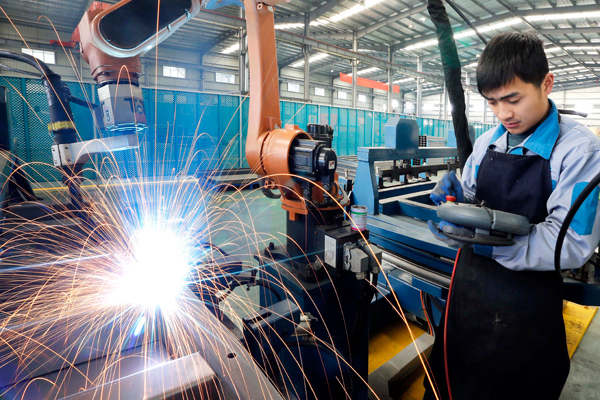
A skilled worker operates a welding robot at an elevator-manufacturing company in Lianyungang, Jiangsu province. [Photo/China Daily]
China accomplished the year’s main task and targets for economic and social development, and got the 13th Five-Year Plan off to a great start.
The economy has registered a slower but stable performance with good momentum for growth.
GDP reached 74.4 trillion yuan, representing 6.7-percent growth, and seeing China outpace most other economies. China contributed more than 30 percent of global growth. The CPI rose by 2 percent. With an 8.5-percent increase in profits, industrial enterprises reversed the previous year’s negative growth of 2.3 percent. Energy consumption per unit of GDP fell by 5 percent. Economic performance improved markedly in quality and returns.
Employment growth exceeded projections.
A total of 13.14 million new urban jobs were added over the course of the year. The number of college graduates finding employment or starting businesses reached another record high. The registered urban unemployment rate stood at 4.02 percent at year-end 2016, the lowest level in years. For China, a large developing country with a population of over 1.3 billion, attaining this level of employment is no easy task.
Continued advances were made in reform and opening up.
Breakthroughs were made in reforms in major sectors and key links, and initial success was achieved in supply-side structural reform. New measures were introduced for opening China up, rapid progress was made in pursuing the Belt and Road Initiative, and a number of major projects and industrial-capacity cooperation projects with other countries were launched.
Economic structural adjustment was stepped up.
Consumption was the main driver of economic growth. The value created by the service sector rose to 51.6 percent of GDP. High-tech industries and equipment manufacturing grew rapidly. In agriculture, production was stable and structural adjustments were made, and we had continued good grain harvests.
New drivers of growth gained strength.
Further progress was made in pursuing the innovation-driven development strategy, and a number of world-leading achievements were made in science and technology. Emerging industries were thriving, and the transformation and upgrading of traditional industries accelerated. People were busy launching businesses or making innovations, with a 24.5-percent year-on-year increase in the number of new businesses registered- an average of 15,000 new businesses daily. With self-employed traders and other market entities included we had an average of 45,000 new market entities launched per day. New growth drivers are opening new prospects for China’s development.
Infrastructure became ever-better able to sustain development.
Over 1,900 kilometers of new high-speed rail lines came into service, and more than 6,700 kilometers of expressways and 290,000 kilometers of rural roads were built of upgraded. Construction picked up pace on urban rail transit facilities and underground utility tunnels. Construction began on 21 major water conservancy projects. The number of 4G mobile communications subscribers grew by 340 million and over 5.5 million kilometers of optical fiber cable were added.
Living standards were improved.
Personal per capita disposable income increased by 6.3 percent in real terms. The number of people living in poverty in rural areas was reduced by 12.4 million, including more than 2.4 million people relocated from inhospitable areas. More than 6 million homes in rundown urban areas and over 3.8 million dilapidated rural houses were renovated. In tourism, domestic trips showed rapid growth, and overseas trip exceeded 120 million. People in both urban and rural areas saw a rise in living standards.
China successfully hosted the G20 2016 Hangzhou Summit, and helped to deliver a number of important pioneering, leading, and institutional outcomes, thus doing its part for global economic governance.
